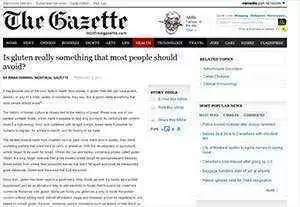
Below is Ron Hoggan's reply the editor of the Montreal Gazette regarding the article: "Open Original Shared Link"
Dear Health Editor:
Celiac.com Sponsor (A12):
Mr. Dunning represents corn as a choice for bread-making prior to the advent of wheat, rye, and barley cultivation. However, the evidence suggests that corn was not yet available 10 to 15 thousand years ago when wheat, the earliest of these three grains, was first cultivated so it wasn’t available more than 20 thousand years ago when wild barley was first exploited ( 1 ). The evidence also indicates that corn was not available in the Near East, where wheat was first cultivated, as corn was a New World food developed by Mesoamerican indigenous peoples ( 2 ) half a world away. In short, corn was not a discarded option for bread making when and where gluten grains were first cultivated.
Perhaps Mr. Dunning should be forgiven such a relatively minor mistake. After all, he is a journalist, not a cereal scientist. However, as he is identified, in the article in question, as a science writer and a critical analyst, that should set the bar a little higher. Surely we may expect him to conduct basic research in an area by at least glancing at some of the peer reviewed reports on this topic. The one time he does this, he harkens to a report on autism as a tool for arguing against the connection between ADHD and gluten*. For instance, he decries the adoption of a gluten free diet by those without celiac disease, gluten induced neuropathy, or wheat allergy. Yet more than 90% of those with celiac disease currently go undiagnosed in the USA (3) and the average delay between onset of symptoms and diagnosis is 11 years (4). Here in Canada, we have very long delays before most of us can get to see a gastroenterologist, so our delays to diagnosis may be even longer. This suggests that our rates of diagnosis are even lower than those of the USA. Perhaps Mr. Dunning’s querulous rhetoric could be more constructively directed at these long delays and the alarming rates of under-diagnosis of celiac disease.
In the interim, it seems very sensible for those with undiagnosed celiac disease to follow a gluten free diet and experience the improved health and quality of life which Mr. Dunning admits are available to these individuals through a gluten free diet. This is an issue that might be revisited when our health care system is providing a timely diagnosis to at least a majority of cases of celiac disease.
Recent research has also shown that those with non-celiac gluten sensitivity, which afflicts about 12% of the general population ( 5), experience even higher rates of morbidity and early mortality than those with celiac disease (6 ). Yet this group is either entirely ignored in Mr. Dunning’s article, or, more likely, it is the unstated focus of his attack.
Mr. Dunning also seems to be unaware that humans lack the full compliment of enzymes necessary for full digestion of gluten proteins thus making many of the constituent amino acids beyond our ability to metabolize when he states that gluten is “a protein that your body uses.” He further asserts that there is no good reason to avoid gluten if one does not have one of the three conditions he lists. Yet my own work suggests that the morphine-like opioids derived from gluten grains may be a contributing factor in several types of malignancy ( 7).
I was pleased to read that Mr. Dunning had at least glanced at data on gluten sensitive idiopathic neuropathy, but chagrined to read his speculation regarding the prevalence of this condition. I have devoted many years to the study of gluten’s impact on human health and have yet to read any work suggesting its prevalence. Perhaps Mr. Dunning could at least hint at his source when making such contentious claims.
Nonetheless, there is clear evidence that a majority of those who experience gluten sensitive idiopathic neuropathy (5) do so in the presence of non-celiac gluten sensitivity, an autoimmune dynamic. Closer to home, our own Scott Frazer has demonstrated that consumption of gluten proteins is a potent force behind the development of many cases of type 1 diabetes (8). Reports of the causal connection between gluten consumption and autoimmune disease abound in the peer reviewed literature and are too numerous to warrant citing.
Mr. Dunning also asserts “there is no evidence that incidence of disease increased worldwide once wheat became a staple.” The field of Archaeology differs dramatically with Mr. Dunning’s claim. In general, it is quite well established that pre-agricultural, hunter-gatherers were much taller and had stronger bones than their descendants who adopted agriculture (9). For instance, a common finding in the skeletal remains of early farmers is a condition of porotic hyperostosis (10).
Mr. Dunning also seems to be unaware that fats, per gram, provide more than twice the energy available in either carbohydrates or proteins and this ignores the added weight of indigestible fibre. The increased caloric density of fats is a principle that most students learn in high school Biology classes. Yet Mr. Dunning asserts that bread was a source of high energy and light weight.
While science requires scepticism and criticism to function, polemic rhetoric based on personal bias generates more heat than light. Mr. Dunning’s report is rife with errors and emotion. Publication of such dogma does little to enhance either the Gazette’s or Mr. Dunning’s credibility. Newspapers are given considerable credence as many readers, myself included, assume that journalists are exercising due diligence in checking their facts prior to publication of these reports. It is only when I read an article such as this one, that is deeply flawed and falls within my area of expertise, that my faith in journalists and the media is undermined.
*note: The only report I could find that fits the meagre description provided by Mr. Dunning is one that involved 15 children who were studied over a 12 week period (11). If this is, indeed, the study Mr. Dunning referred to, it hardly provides conclusive evidence of anything beyond the obvious need for more comprehensive study in this area. His use of these data as a springboard for his absolutist claims seems highly questionable, to say the least.
Sincerely,
Ron Hoggan, Ed. D.
Royal Roads University, Continuing Studies
co-author: Dangerous Grains ISBN: 978158333-129-3 www.dangerousgrains.com
editor: Journal of Gluten Sensitivity www.celiac.com
editor/co-author: Cereal Killers Open Original Shared Link
Sources:
- Open Original Shared Link
- Open Original Shared Link
- Fasano A, Berti I, Gerarduzzi T, Not T, Colletti RB, Drago S, Elitsur Y, Green PH, Guandalini S, Hill ID, Pietzak M, Ventura A, Thorpe M, Kryszak D, Fornaroli F, Wasserman SS, Murray JA, Horvath K. Prevalence of celiac disease in at-risk and not-at-risk groups in the United States: a large multicenter study. Arch Intern Med. 2003 Feb 10;163(3):286-92
- Green PHR, Stavropoulos SN, Panagi SG, Goldstein SL, Mcmahon DJ, Absan H, Neugut AI. Am J Gastroenterol. 2001 Jan;96(1):126-31
- Hadjivassiliou M, Gibson A, Davies-Jones GA, Lobo AJ, Stephenson TJ, Milford-Ward A. Does cryptic gluten sensitivity play a part in neurological illness? Lancet. 1996 Feb 10;347(8998):369-71.
- Anderson LA, McMillan SA, Watson RG, Monaghan P, Gavin AT, Fox C, Murray LJ. Malignancy and mortality in a population-based cohort of patients with celiac disease or "gluten sensitivity". World J Gastroenterol. 2007 Jan 7;13(1):146-51.
- Hoggan R. Considering wheat, rye, and barley proteins as aids to carcinogens. Med Hypotheses. 1997 Sep;49(3):285-8.
- Open Original Shared Link
- Lutz W. [The carbohydrate theory]. Wien Med Wochenschr. 1994;144(16):387-92.
- Wright L, Chew F, Porotic Hyperostosis and Paleoepidemiology: A Forensic Perspective on Anemia among the Ancient Maya. Am Anthro. 1998 Dec; 100: 924-939.
- Elder JH, Shankar M, Shuster J, Theriaque D, Burns S, Sherrill L. The gluten-free, casein-free diet in autism: results of a preliminary double blind clinical trial. J Autism Dev Disord. 2006 Apr;36(3):413-20.





.webp.8b3d1471832f98be2d98a1696a860e34.webp)




Recommended Comments